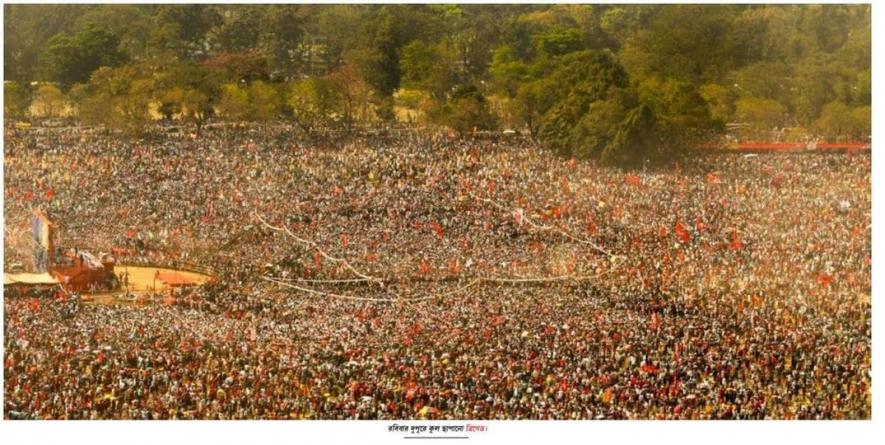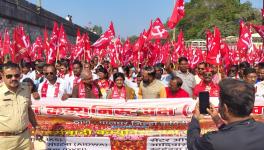West Bengal Elections: Experts Observe a Control Shift from Upper, Middle Classes

Brigade Parade Ground in Kolkata
Kolkata, March 3: If one were to ask what stood out among several takeaways from the Brigade Parade Grounds rally on February 28, it was a message of togetherness that the organisers – the Left Front, the Congress and their new ally the Indian Secular Front – were able to convey.
The parties together are going to be a factor in the forthcoming Assembly Elections in West Bengal. It was a message as much for the huge gathering as it was for the ruling Trinamool Congress and the Bharatiya Janata Party, which is eyeing its maiden ministry in the state,
This was the first public meeting by the coalition; so long the TMC and the BJP had been assiduously trying to create the impression that it was going to be a two-way contest between them because the Left Front constituents, their associates and the Congress were all signboard entities and, therefore, inconsequential.
It is true that the ISF of Furfura Sharif cleric Abbas Siddiqui, floated six weeks ago on January 21, is an unknown quantity even for its senior partners. At the moment they are relying on the cleric’s public declaration that he conceived the ISF as an umbrella organisation for minorities, Dalits, other backward classes and the other marginalised sections of society.
The participation of supporters and sympathisers organised by the ISF at Sunday’s Brigade rally was impressive and people are already suggesting that Siddiqui’s oratory and articulation may succeed in splitting the Muslim votes.
That, therefore, may prove to be a cause for concern for TMC supremo Mamata Banerjee, who has been benefitting from the solid support of the Muslims, who at 28% of the electorate, constitute a critical mass. The split should, therefore, create a direct support base for the ISF and indirectly benefit the coalition based on the assumption that the BJP will work harder to consolidate the Hindu vote as part of its politics of polarisation. There is every possibility of the emergence of a counter-balancing factor in favour of the energised Left Front and the Congress.
Those sections of voters who used to support the Left Front or the Congress but had opted for either the TMC or the BJP in the last two assembly and Lok Sabha elections may consider backing their original party of choice once again. Given these possibilities the forthcoming assembly polls may well turn out to be a triangular contest instead of a two-way fight as the TMC and the BJP have been wanting it to be.
The other takeaways were the return of bread-and-butter issues that impact daily lives of the common people into the narrative; the youth once again coming forward in large numbers to Left fold, particularly to the Communist Party of India (Marxist) and the emergence of assertive, demanding caste groups on the state’s political scene.
Persons among the intelligentsia Newsclick interacted with identified these takeaways. Dr. Amitava Kanjilal, who heads the political science department at Siliguri College, said so long the perception was that the BJP was the sole challenger to the incumbent TMC. However, the Brigade rally has forced a change in perception. From being treated as inconsequential to be being reckoned as a factor that can force a triangular fight is no mean transition, Kanjilal told Newsclick.
To Prof. Suranjan C. Mukhopadhyay, who teaches sociology at Amity University in Raipur, Chhattisgarh, a new formula is being experimented with in the state. According to it, he opined, the established Left Front is aligning with non-left parties to make what Mukhopadhyay thinks is a last-ditch attempt to preserve democracy, whose values have been steadily eroding in recent years. Pro-poor, pro-common people policies, which help nurture democracy and facilitate the widest possible people’s participation in the democratic process, are bring discarded. He cited the privatisation of education, which is fast becoming a “new normal”, is directly affecting the poor who just can’t afford it. Going by these unwelcome ground realities, the Brigade event was historic, Mukhopadhyay told Newsclick.
Prof. Sibaji Pratim Basu, who teaches political science and is dean, Faculty of Arts and Commerce at Vidyasagar University in Midnapore, is of the view that success in mobilising several lakhs of people at Brigade will act as a confidence booster for the Left and that it will now have to concentrate on consolidation. Identity politics has gained ground in West Bengal too and what is being practised is what is described in political science as “interest articulation. Remember, it is for this reason that Mayawati, despite several attempts could not make inroads in the Matua vote bank,” he said.
Agitations and mobilisation on issues that matter to the common people have traditionally sustained the Left and it was good to see such matters being made a part of the narrative at Brigade, Basu said.
The fluttering flags of the CPI (M)’s youth and student wings were noticeable and their large-scale participation is certainly encouraging and augurs well for the future, agreed Dr. Kanjilal, Prof. Mukhopadhyayay and Prof. Basu. Setting a sort of precedent, CPI (M) veteran and Left Front chairman Biman Bose, who was presiding over the meeting, sought “permission” to step back and handed over the mic to the party’s youth activist and actor Badsha Moitra to introduce the speakers. This role was shared by two Student Federation of India activists – Aishee Ghosh and Dipshita Dhar.
“Bimanda did what had been decided by the leadership,” CPI (M)’s leader of the legislature party in the outgoing Assembly, Sujan Chakraborty, told Newsclick when asked if it was an impromptu decision or a planned one. Large sections of the audience hailed the CPI (M)’s tribal activist and central committee member Debalina Hembrom when she rose to address them.
Taking an overall view of the evolving situation, Prof. Mukhopadhyay felt that with caste politics gaining ground, as is evident from the articulation of demands by the Matuas and the Rajbanshis, among others, it appears the control over politics in West Bengal is shifting from the upper and middle class people. The control of the upper and middle has been there during the Congress regime; it continued through the Left Front regime. However, there are clear signs of a transformation occurring, he added.
“Recall the days of Siddhartha Shankar Ray, Jyoti Basu and even Buddhadev Bhattacharya. They were highly educated and they had a pedigree of their own. Certainly in the days of Ray and Basu you would not have seen a Debolina Hembrom addressing a Brigade rally in a mix of Santhali and Bengali languages or a Scheduled Caste leader publicly claiming ministership in advance on winning if their party came to power. The task of Jagjivan Ram, undoubtedly one of India’s tallest Dalit leaders, in those days was popular as a Harijan leader and was to garner votes from the community for the Congress,” he elaborated.
However, in UP, when Mayawati led her party to victory with an absolute majority for the first time, she had declared herself as the Chief Ministerial candidate before the elections. The Furfura cleric, who hails from a village and now is based in a small district town, has identified himself several times as a ‘Bangali’, (not as a Muslim) and emphatically said: “I am here to stake and realise my claim as a matter of right; I want partnership in the spoils of power when the opportunity comes our way”. “Mainstream parties have no option but to recognise their importance and accede to their claims. That is why I said control in politics is shifting from upper and middle class people”, the sociology professor argued.
Dr Kanjilal and Prof Basu chose to dwell on the Siddiqui factor. While the ISF may bring the alliance closer to the TMC and the BJP, the Left and the Congress have to be watchful that the Furfura cleric does not convert his party into a rank communal organisation with a predominantly religious agenda. West Bengal cannot afford a repetition what happened in pre-Independence times. “If he does, the ideal thing will be to dissociate themselves which I don’t think will be difficult,” Dr. Kanjilal said.
Prof. Basu went a step further and said the Left Front should tread with caution while dealing with the cleric who, within six weeks after floating a party, has started talking in terms of claims and “partnership/bhagidari”. Then, without mentioning the Congress leader Adhir Ranjan Chowdhury by name, he reiterated that while seat adjustment talks with the Left was over but because of the laxity on the part of a particular Congress leader, seat sharing with that party is still to be decided upon. It was evident that these indirect comments were targeted at Chowdhury as he has been resisting the cleric’s demand for several seats in Malda and Murshidabad districts where the Muslim vote is crucial and the Congress still has a solid support base.
“Therefore, I feel the young, fledgling party leader was not correct in targeting Chowdhury. Today he is not one of those ordinary Congress leaders; he is the leader of the Opposition in Lok Sabha, he is the chairman of the Public Accounts Committee and he heads the Pradesh Congress Committee. Also, from what I observed on the TV I think the leaders could have tempered their jubilation when Siddiqui appeared on the podium,” Prof. Basu told Newsclick.
Get the latest reports & analysis with people's perspective on Protests, movements & deep analytical videos, discussions of the current affairs in your Telegram app. Subscribe to NewsClick's Telegram channel & get Real-Time updates on stories, as they get published on our website.
























